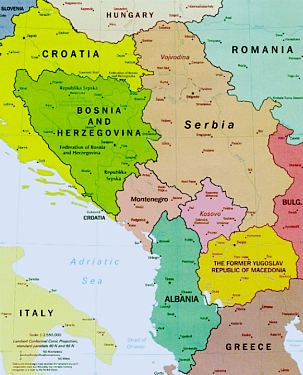Trouble in Macedonia
A repeat of the Kosovo crisis is brewing, this time in Macedonia. It’s a many-faceted affair, and ethnic Albanian Muslims in Macedonia are only one component of it.Part of the trouble is caused by the name “Macedonia”. The Greeks claim a proprietary interest in the name as a reference to the northwestern province of their own country. Macedonia attempted to placate Greek opinion by making the country’s official name “The Former Yugoslav Republic of Macedonia”, but that wasn’t enough to assuage Hellenic national sentiment.

The UN is mediating without success between Greece and Macedonia over the issue during talks in Vienna:
[UN mediator Matthew] Nimetz’s latest proposals — Republic of Upper Macedonia, New Republic of Macedonia and Republic of Macedonia (Skopje) — have been already rejected by disputing parties. [Macedonian Prime Minister Nikola] Gruevski sees the proposals unacceptable.
The stalemate over the country’s name is significant, because Macedonia is hoping to join NATO at the upcoming summit in Bucharest on April 2nd. Greece is threatening to veto Macedonian membership over the issue of the country’s name.
To make matters worse, Macedonia is the throes of a political crisis over the issue of Kosovar independence. Croatia, Hungary, and Bulgaria have recognized Kosovo, ratcheting up the pressure on Macedonia to do the same. But any recognition of Kosovo by Macedonia would incur the enmity of neighboring Serbia, and possibly trigger sanctions and other actions damaging to the Macedonian economy.
The crisis came to a head a week ago when the Democratic Party of Albanians (DPA), a key part of the ruling coalition in Skopje, decided to leave the government. According to Maxfax:
The Democratic Party of Albanians left the government after the Prime Minister did not respond on the party’s six ultimatum demands, including resocialization of NLA’s fighters, making the Albanian language and flag official, urgent recognition of Kosovo, increasing of representation of Albanians in the public administration and closing of the four Hague cases.
One can see why the Macedonian government might choke on some of these demands. Even if it can be pushed to recognize Kosovo — and it looks like the pressure may be so strong that it will have to — the rest of the demands set the stage for a reprise in western Macedonia of the bloody conflict in Serbia over Kosovo.
Macedonia’s troubles are deeper and more difficult to resolve than Serbia’s because of the ethnic mixture within Macedonian territory. Out of roughly two million people, the ethnic breakdown (as of 2004) looks like this:
 - - - - - - - - -
- - - - - - - - -| Macedonian | 66.6% | |
| Albanian | 22.7% | |
| Turkish | 4% | |
| Muslim | 2.3% | |
| Roma (Gypsy) | 2.2% | |
| Serb | 2.1% |
I’m not sure what “Muslim” means in this context — possibly Bosniak or Arab — but if you add it to the Albanians and the Turks, Muslims make up 29% of the population. Assuming that the relative demographics are the same as in other parts of Europe, with the non-Muslim population decreasing while the Muslim birthrate remains high, the political paralysis in evidence now seems likely to continue indefinitely.
The centuries-old conflict with Greece makes matters worse. The region was originally ethnically Greek, part of a larger territory that included what is still called Macedonia in northwestern Greece. During the second half of the first millennium A.D., as Byzantine strength receded, the region was invaded by Slavic tribes. The largest ethnic group in the country is Slavic and closely related to the Bulgarians.
The Macedonians share responsibility for the ongoing dispute with Greece, since some of the more militant Slavic nationalists draw the map of Macedonia to include the ethnically Greek areas of the province Macedonia south of the border. Greek intransigence over NATO membership for Macedonia is motivated partly out of a long-term resentment and fear of Macedonian irredentism.
Like the Bulgarians and the Serbs, Macedonia had to endure five centuries of brutal Ottoman rule, and the non-Muslims in the country are understandably chary of granting special rights and autonomy to the Albanian minority.
The situation is a recipe for disaster. Watch the dominos lining up here: First an independent Kosovo, then the demands for special rights for Albanians in Macedonia. Next comes a failure to gain NATO membership, then ethnic unrest, violence, UN action, peacekeepers, and an eventual push for a Kosovo-like solution in western Macedonia. We all know the drill.
This long slippery slope leads towards a Greater Albania on the eastern shore of the Adriatic and extending into the heart of the Balkans.
What comes after that?





